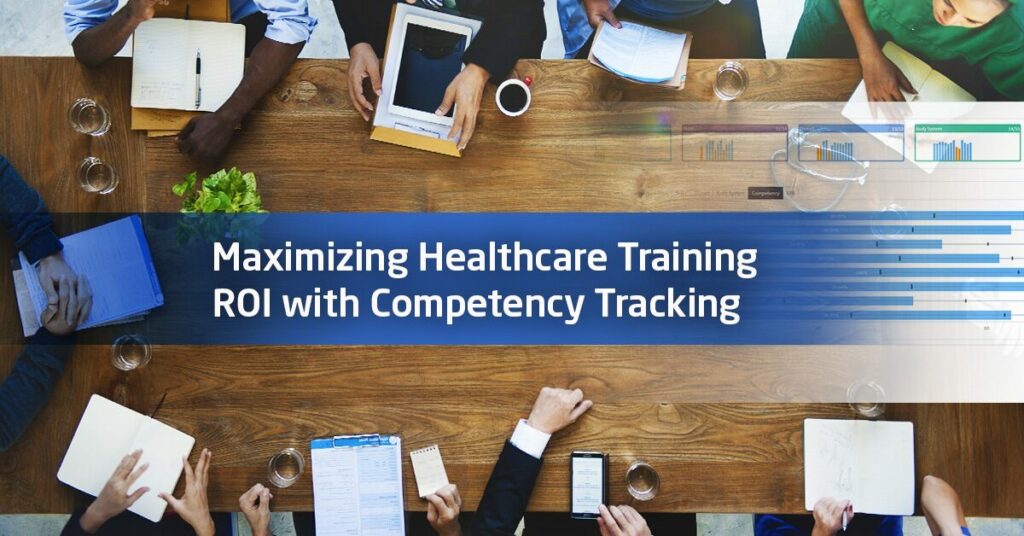In recent years, the focus on competency-based healthcare training and ongoing professional development has intensified greatly. Healthcare systems recognize the necessity of maintaining a highly skilled and knowledgeable workforce to meet ever-evolving patient care demands.
Implementing effective competency tracking is a crucial component of this. By leveraging competency tracking in their training, healthcare institutions can significantly enhance their return on investment (ROI).
Here, we’ll explore competency tracking’s benefits and role in maximizing ROI in healthcare training. We’ll also look at the challenges in quantifying training ROI and offer practical solutions to these challenges.
Understanding Competency Tracking in Healthcare Training
Competency tracking ensures that all staff members meet the required standards of care and can perform their duties competently by assessing skills, knowledge, and abilities through various methods, including simulations and clinical observations.
This approach — part of competency-based healthcare education — ensures care providers can effectively apply their skills in real-world settings, aligning educational outcomes with industry needs. At the same time, it benefits educators by enabling them to tailor instruction, provide targeted feedback, and address areas where improvement is needed.
However, these are just a few benefits of competency tracking in healthcare. In the next section, we’ll examine the potential of competency tracking more in-depth.
Benefits of Competency Tracking
Improved and Faster Onboarding
Competency tracking can improve employee onboarding by quickly identifying new hires’ skills and knowledge levels. This allows for personalized training programs that address individual needs, reducing the time it takes for new staff to get fully up to speed.
In turn, faster onboarding translates to quicker integration into the healthcare team — a welcome benefit to already short-staffed care teams that will only become more significant as healthcare workforce shortages increase.
Enhanced Patient Care Quality
Competency tracking in healthcare ensures that professionals are well-prepared to deliver safe, effective care, resulting in better care outcomes. This rigorous focus on training promotes adherence to best practices, enabling staff to consistently provide high-quality care, which can significantly enhance the institution’s reputation.
Risk Reduction
It’s long been known that medical errors are a massive problem in the United States and across the globe, with one study identifying them as the third leading cause of death in the US.
Competency tracking can help reduce the risk of errors and adverse events by identifying areas where additional training is needed. This proactive approach to skill development ensures that healthcare professionals are well-prepared to handle various clinical scenarios safely, translating to fewer costly mistakes and greater patient trust.
Better Compliance with Healthcare Regulations
Healthcare regulations constantly evolve, and competency tracking ensures staff members comply with the latest standards. This helps healthcare systems maintain accreditations, secure funding, and avoid regulatory penalties.
Leveraging Data Analytics for Continuous Improvement
Competency tracking generates valuable data that can be analyzed to identify trends, strengths, and areas for improvement. This data-driven approach enables healthcare institutions to refine their training programs and ensure optimal performance. Health systems can allocate resources more efficiently by understanding performance trends and implementing targeted training interventions.
Engaging Staff in a Culture of Excellence
A robust competency-tracking program fosters a culture of continuous learning and professional development. Engaging staff in ongoing education initiatives promotes a sense of ownership and commitment to excellence. When healthcare professionals feel supported in their growth, they are more likely to stay with the organization, reducing costly turnover.
Challenges in Quantifying Training ROI
While highly beneficial, measuring healthcare training programs’ financial and qualitative ROI can be challenging. Nonetheless, it must be done, as many health systems strain under the pressure of low operating margins.
Healthcare institutions often struggle to link training investments directly to improved patient outcomes or financial performance. This difficulty is compounded by the complex nature of healthcare delivery, where multiple factors influence results. After all, patient outcomes can be affected by various external factors that are hard to isolate from training impacts.
Competency tracking provides a solution to these challenges by offering tangible metrics to assess the effectiveness and efficiency of training investments. By systematically documenting and evaluating competencies, healthcare organizations can:
- Track improvements in staff performance over time.
- Identify gaps and address them promptly.
- Demonstrate compliance with regulatory standards.
- Make data-driven decisions to optimize training programs.
However, it must be noted that effectively measuring competencies begins well before implementing any competency-based training program. It starts with specific, well-defined competencies. Otherwise, as the saying goes, “Garbage in, garbage out.”
It’s also paramount that healthcare systems plan for how they will measure the efficacy of any new program before implementation. This includes what will be measured, when, and why it’s important.
When implemented correctly, competency tracking can provide clear evidence of training ROI by showing direct correlations between training activities and improvements in clinical performance, patient outcomes, and operational efficiency.
Competency Tracking Doesn’t Have to Be Complicated
Competency tracking is crucial for measuring the efficacy of healthcare education and training programs and maximizing ROI. Fortunately, competency tracking doesn’t have to be difficult.
By embracing competency-tracking solutions, healthcare organizations can cultivate a highly competent workforce dedicated to delivering exceptional patient care.
EMS’s competency-based assessment management platform makes it easy for healthcare institutions to track and manage their training processes.
Schedule a discussion today to learn more about how we can help you ensure compliance and continuously improve staff performance.

